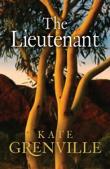 6838178489557838578.jpg
6838178489557838578.jpg
 6838178489557838578.jpg
6838178489557838578.jpg
'Daniel Rooke, soldier and astronomer, was always an outsider. As a young lieutenant of marines he arrives in New South Wales on the First Fleet in 1788 and sees his chance. He sets up his observatory away from the main camp, and begins the scientific work that he hopes will make him famous.
'Aboriginal people soon start to visit his isolated promontory, and a child named Tagaran begins to teach him her language. With meticulous care he records their conversations. An extraordinary friendship forms, and Rooke has almost forgotten he is a soldier when a man is fatally wounded in the infant colony. The lieutenant faces a decision that will define not only who he is but the course of his entire life.
'In this profoundly moving novel Kate Grenville returns to the landscape of her much-loved bestseller The Secret River. Inspired by the notebooks of William Dawes, The Lieutenant is a compelling story about friendship and self-discovery by a writer at the peak of her powers.' (Publisher's blurb)
Sequel to The Secret River (2005).
'Australian scientists have led many crucial scientific breakthroughs – from the manufacturing and processing of penicillin, to the first in-vitro fertilisation pregnancy. Yet there is still a need for science to be more widely appreciated in our broader culture.' (Introduction)
 The Lieutenant, Kate Grenville
Essendon North
:
Radiant Heart Publishing
,
2015
8919183
2015
single work
criticism
The Lieutenant, Kate Grenville
Essendon North
:
Radiant Heart Publishing
,
2015
8919183
2015
single work
criticism
 Cultural Memory and Literature : Re-imagining Australia's Past
Leiden
:
Brill
,
2015
11024641
2015
multi chapter work
criticism
Cultural Memory and Literature : Re-imagining Australia's Past
Leiden
:
Brill
,
2015
11024641
2015
multi chapter work
criticism
'Cultural memory involves a community shared memories, the selection of which is based on current political and social needs. A past that is significant to a national group is re-imagined by generating new meanings that replace earlier certainties and fixed symbols or myths. This creates literary syncretisms with moments of undecidability. The analysis in this book draws on Renate Lachmann theory of intertextuality to show how novels that blur boundaries without standing in for history are prone to intervene in cultural memory. A brief overview of Aboriginal politics between the 1920s and the 1990s in relation to several novels provides historical and political background to the links between, and problems associated with, cultural memory, testimony, trauma, and Stolen Generations narratives, which are discussed in relation to Sally Morgan My Place and Doris Pilkington Rabbit-Proof Fence. There follows an analysis of novels that respond to the history of contact between Aboriginal and settler Australians, including Kate Grenville historical novels The Secret River, The Lieutenant, and Sarah Thornhill as examples of a traditional approach. David Malouf Remembering Babylon charts how language and naming defined our early national narrative that excluded Aboriginal people. Intertextuality is explored via the relation between Thea Astley The Multiple Effects of Rainshadow, Chloe Hooper The Tall Man, and the Royal Commission into Aboriginal Deaths in Custody. Kim Scott Benang: from the heart and That Deadman Dance and Alexis Wright Carpentaria reflect a number of Lachmann concepts, syncretism, dialogism, polyphony, Menippean satire, and the carnivalesque.' (Publication summary)